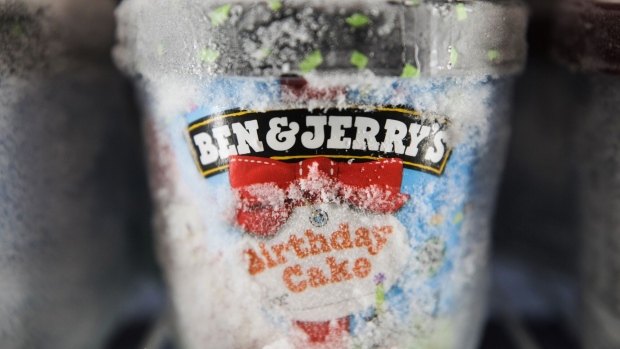Mar 19, 2024
Unilever to separate ice cream unit and cut 7,500 jobs
, Bloomberg News

The new boss of Unilever Plc wants to reverse years of lacklustre performance with an ambitious plan to separate the conglomerate’s ice cream arm and remove layers of middle management.
About nine months since taking charge of the Anglo-Dutch company, Hein Schumacher moved to offload a division worth as much as US$18 billion, according to Barclays analysts. It’s home to brands including Ben & Jerry’s and Magnum — which a previous Unilever chief, Paul Polman, dubbed “one of the greatest-ever success stories in the consumer goods market.”
It’s just one part of Schumacher’s wider plan to drive growth and boost profits at Unilever and unpick a legacy of overexpansion, missed opportunities and failed M&A. The new CEO, who was appointed after activist investor Nelson Peltz took a stake in the company and joined its board, also plans to cut 7,500 jobs — almost 6 per cent of the Dove soap maker’s total of 128,000.
“Our overall idea is to do fewer things better, and with greater impact,” Schumacher said on a call with reporters. “Ice cream is truly a different business. It is already managed separately than our other activities.”
The ice cream division had sales of €7.9 billion (US$8.6 billion) in 2023, but its profit margin is less than half that of the company’s personal care unit, according to data compiled by Bloomberg. It’s also a seasonal, capital-intensive business requiring more complex cold-chain logistics.
Shares surge
The company said a demerger that creates a new listed entity is the most likely option for separating the unit, though it has previously sold other slow-growing businesses to private equity firms.
Unilever rose 3 per cent in London trading, leaving the shares down 3 per cent for the past year.
The restructuring shows how Schumacher is making his mark on the company after taking over from Alan Jope, who had angered shareholders with a botched effort to buy GSK Plc’s consumer health division. The new chief executive officer is aiming for €800 million in cost savings over the next three years as Unilever responds to a period of slow growth when consumer spending was constrained by high inflation and many shoppers switched from branded goods to private labels.
The restructuring will leave the company focused on four businesses: beauty and wellbeing, personal care, home care and nutrition. Rival Nestle SA previously separated its ice cream business by setting up a joint venture with private equity firm PAI Partners.
Shedding the unit will also remove a headache for Unilever, which has had to deal with controversies over political stances taken by Ben & Jerry’s. In December 2022, Unilever settled a court battle with the ice cream label’s independent board after the brand objected to its products being sold in the Israeli-occupied West Bank.
In a separate incident earlier that year, Unilever criticized Ben & Jerry’s after it said in a social media post that US President Joe Biden was fanning “the flames of war” by sending troops to Europe, weeks before Russia invaded Ukraine.
Big food companies have also been trying to adjust their portfolios as new weight-loss drugs from Novo Nordisk A/S and Eli Lilly & Co. gain popularity. Ice cream no longer sits well alongside other Unilever brands like Knorr stock cubes and Domestos cleaners, analysts said.
‘Makes sense’
“We believe a separation of ice cream makes sense given its slower profile and lack of cost synergies due to its cold supply chain,” said James Edwardes Jones at RBC Capital Markets.
If the proposed cost savings boost profits, the company will be able to reinvest in research and development and marketing, he said.
After the separation of the ice cream business, which also includes the Cornetto brand, Unilever said it’s aiming for mid-single digit growth in underlying sales, with a “modest margin improvement.”
What Bloomberg Intelligence says:
“Unilever’s plan to separate out its Ice Cream arm for probable divestiture makes sense, removing seasonality from growth and a low-margin drag. Yet the end-2025 separation date suggests there’s a long and bumpy road ahead, combined with disruption from a new productivity program.” -- Deborah Aitken, senior analyst
The separation of the ice cream business is the latest of a number of moves by Unilever to streamline its portfolio since it fended off an unsolicited takeover bid from Kraft Heinz Co. in 2017. Later that year it sold its margarine and spreads business to KKR & Co. Four years later it agreed to sell its tea unit to CVC Capital Partners.
Schumacher joined Unilever from dairy cooperative Royal FrieslandCampina. Under Jope and his predecessor, Polman, the company had made the social “purpose” of its brands a key priority, drawing criticism from some investors who wanted the company to focus more on its bottom line.
If the ice cream business is spun off with a separate listing, the destination will be decided in the next 18 months, Schumacher said on the call. The food and ice cream divisions are currently based in the Netherlands, and the ice cream business is in the process of moving its headquarters to Amsterdam from Rotterdam, he said.
Unilever was formed from a fusion of British and Dutch companies. About four years ago it decided to consolidate its overall headquarters in London after maintaining dual nationality for decades. Schumacher said Unilever as a whole is committed to staying in London.
With assistance from Joel Leon.



